For those susceptible to pollen, mold, and other allergens, it’s essential to recognize the impact of their home’s HVAC system on indoor air quality.
As spring approaches, many individuals brace themselves for the onset of seasonal allergies. Those susceptible to pollen, mold, and other allergens can suffer during this time. It’s essential to recognize the impact of their home’s HVAC system on indoor air quality. This blog looks into why good indoor air quality is important for those with allergies. We explore how an HVAC system could cause poor indoor air quality and worsen allergies. We also provide actionable strategies to combat this issue.
The Importance of Good Indoor Air Quality for Those With Spring Allergies
Good indoor air quality plays a critical role in managing seasonal allergy symptoms. Maintaining clean and allergen-free indoor air is crucial. It reduces exposure to common allergens such as pollen, mold spores, and dust mites. Clean indoor air supports respiratory health. It reduces the presence of airborne allergens that can trigger allergic reactions. Optimal indoor air quality contributes to your comfort and well-being. This allows allergy sufferers to experience relief from common seasonal allergy symptoms.
How Your HVAC System Could Contribute to Poor Indoor Air Quality
If you aren’t careful, HVAC systems can lead to poor indoor air quality. This can worsen allergy symptoms. HVAC systems with poor or old filters may fail to capture and remove airborne allergens. This can lead to their circulation throughout the indoor environment. HVAC systems that are not maintained can contribute to increased indoor humidity. This creates an environment conducive to mold growth, a common allergen trigger. Dust, pet dander, and other pollutants may build up within HVAC ductwork and other parts. The system can then redistribute throughout living spaces and aggravating allergy symptoms.
Combatting the Impact of HVAC Systems on Spring Allergies
Using strategies to combat the impact of HVAC systems on spring allergies is vital.
- Regular maintenance. Schedule routine HVAC maintenance. This service includes filter replacement, duct cleaning, and inspection for moisture or mold. This can ensure optimal system performance and indoor air quality.
- High-efficiency filters. Install high-efficiency air filters designed to capture a higher percentage of airborne particles. This includes common allergens, thus improving indoor air quality.
- Humidity control. Use dehumidifiers to maintain appropriate indoor humidity levels. This prevents mold growth and reduces the presence of moisture-related allergens.
- Air purification. Consider the use of standalone air purifiers equipped with HEPA filters. This can further reduce the concentration of airborne allergens within living spaces.
By using these strategies, you can help reduce the impact of your HVAC system on indoor air quality. You can ease the burden of spring allergies within your home environment.
Contact Us
HVAC systems can impact indoor air quality and impact spring allergies. It’s important to understand good indoor air quality for those with allergies. Be sure to use practical strategies to mitigate allergen exposure. It helps you create healthier and more comfortable indoor environments. If you need help maintaining your HVAC system to improve indoor air quality, contact us today. By prioritizing these, you can combat the impact of your HVAC system on spring allergies. You can work to promote relief from seasonal allergy symptoms.

